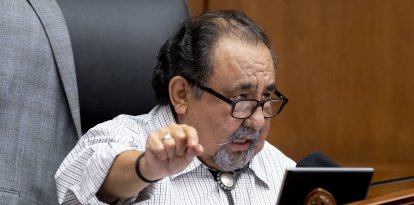The history of impeachment in the United States: Johnson, Clinton, Trump and now Biden
So far, two Republicans and one Democratic president have been unsuccessfully impeached by Congress.
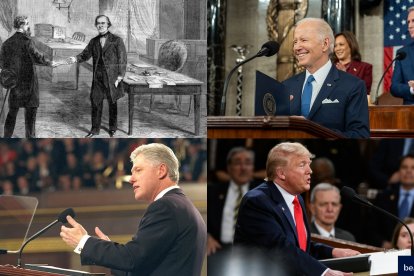
Wikimedia Commons
Kevin McCarthy formally announced an impeachment inquiry against Joe Biden. According to the speaker of the House of Representatives, Republicans uncovered serious and credible allegations of Biden's illicit actions. Specifically, McCarthy spoke of a "culture of corruption." If history repeats itself, this will give way to formal articles against the acting Democratic president, who would join a short list of impeached presidents: Andrew Johnson, Bill Clinton and Donald Trump.
The notion of impeachment is not new. In fact, it was born with the British monarchy as a method of holding royal officials accountable for their public actions, although it was restricted to officials only and not the king. It is estimated that the idea itself dates back to the mid-1300s and that it was extracted by the founding fathers when they were putting together the Constitution.
The Philadelphia Convention saw James Madison, Benjamin Franklin, James Wilson, and Governor Morris in favor of this practice, which would be championed by Alexander Hamilton in the Federalist Papers (number 66).
There, he strongly advocated for the Senate rather than the Supreme Court as the place where impeachment charges related to "misconduct of public men or, in other words, for the abuse or violation of some public trust" would be considered.
Finally, it was enshrined in Section 3 of Article 1: "The Senate shall have the sole Power to try all Impeachments … [but] no person shall be convicted without the Concurrence of two-thirds of the Members present".
While the speaker of the House awaits more information and evidence from the committees in charge, the following were the U.S. presidents who were subjected to impeachment.
Andrew Johnson
Heavily criticized by historians, the man who assumed the presidency after the assassination of Abraham Lincoln became the first president in the country's history to be impeached. He took the reins at a very delicate moment, facing the consequences of the Civil War with a Republican-controlled Congress.
After vetoing legislation protecting the rights of those freed from slavery and ignoring the Tenure of Office Act (passed to prevent him from firing Secretary of War Edwin Stanton), the GOP was furious with the president.
The House initiated proceedings in 1868 on various charges, including felonies and misdemeanors. There, the charges were approved by a large majority, 126 in favor and 47 against, so the procedure passed to the Senate, where the Republicans held more than two-thirds of the seats. Of the 11 items against Johnson, the Senate voted on 3.
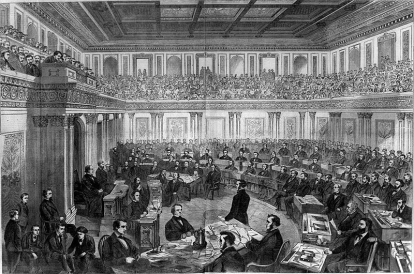
The internal debate in the Republican Party was the following: respect the presidential investiture or remove the president because of his lack of sympathy for Congress. The first vote was held on May 16, 1868. At that time, there were 54 senators, 2 for each of the 27 states, since the 10 Confederates had not yet been readmitted for representation in the union.
Respecting the two-thirds threshold necessary to remove the president from office, 36 affirmative votes were needed. By the time they finished adding up, the Republicans had 35. Johnson was saved by one vote from being expelled from the Oval Office and would end his term in 1869 to make way for Ulysses S. Grant.
Bill Clinton
The first Democrat to be impeached went through the process in 1999 on charges of obstruction of justice and lying under oath. It all started with an accusation of sexual harassment by Paula Jones, which was exacerbated by the Monica Lewinsky case.
The investigation that led to the impeachment trial was conducted by Kenneth Starr, who wrote in his report that the president had lied under oath during a deposition.
In addition, he wrote that Clinton "attempted to influence the testimony of a grand jury witness that he had direct knowledge of facts which would reveal the falsity of his testimony in a deposition; attempted to obstruct justice facilitating a witness's plan to refuse to comply with a subpoena; attempted to obstruct justice by encouraging a witness to submit a sworn statement that the president knew would be false...; lied to possible witnesses of the grand jury knowing that they would then repeat those lies before the grand jury; and engaged in a pattern of conduct inconsistent with their constitutional duty to faithfully execute the laws...; lied to potential grand jury witnesses, knowing that they would then repeat those lies before the grand jury; and engaged in a pattern of conduct inconsistent with his constitutional duty to faithfully execute the laws."
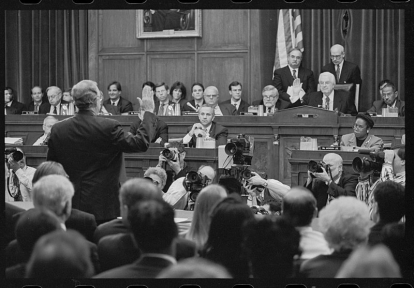
In December 1998, the House Judiciary Committee, chaired by Henry George Hyde, agreed to send four items to the floor, ultimately approving two: perjury before a grand jury (228-206) and obstruction of justice (221-212). Virgil Goode, Ralph Hall, Paul McHale, Charles Stenholm and Gene Taylor were the Democratic congressmen who voted in favor of the approved charges.
The impeachment trial arrived in the Senate on Jan. 7, 1999, and was presided over by Chief Justice William Rehnquist. After an initial screening, the arguments favoring Clinton's impeachment were presented over three days, from Jan. 16-14. The defense did its work between the 19th and 21st and then moved on to questions from the members of the Senate.
After motions to dismiss and a parade of witnesses, the Senate voted on both charges on Feb. 9. Again, a two-thirds vote (67) was required to approve the dismissal of the Democrat, elected in 1992 and again in 1996.
The perjury charge was defeated with 45 votes in favor (all Republicans) and 55 against (45 Democrats and 45 Republicans), while the obstruction of justice charge met the same fate with 50 votes in favor and 50 against.
"Now that the Senate has fulfilled its constitutional responsibility, bringing this process to a conclusion. I want to say again to the American people how profoundly sorry I am for what I said and did to trigger these events, and the great burden they have imposed on the Congress and on the American people," Clinton said after being acquitted.
Donald Trump
The Republican and current presidential candidate is the last on the list and the first to have been indicted on two separate occasions. While House Democrats attempted to oust him from office in 2017, months after he took office, the serious attempt began in mid-2019.
In September of that year, whistleblower testimony claimed that Trump had abused his position to solicit Ukrainian President Volodomir Zelensky to create a damaging narrative against Joe Biden, then a presidential candidate.
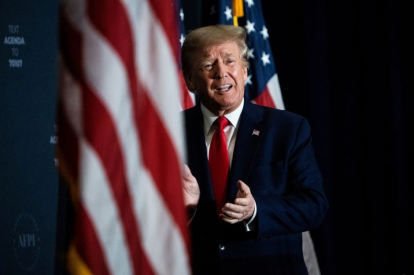
President Donald Trump on stage in Tampa applauding in July 2022.
Nancy Pelosi announced the formal investigation on Sept. 24, 2019, stating that the Republican had betrayed his oath and jeopardized the integrity of the 2020 presidential election.
After months of testimony, in December, Pelosi authorized the House Judiciary Committee to begin drafting articles of impeachment. Finally, two charges emerged: abuse of power and obstruction of justice. Both were approved on party lines to advance to the House Plenary, formally voted on Dec. 18.
The obstruction of justice article was approved by 230 votes in favor and 197 against, while the abuse of power article received 229 affirmative votes and 198 negative votes. All Republicans voted against the first, joined by two Democrats (Collin Peterson and Jeff Van Drew) and Tulsi Gabbard, who abstained. Justin Amash, a former Republican and independent, voted in favor.
The abuse of power also had all the Republicans in opposition, who also added an extra Democrat, Jared Golden.
Senate Republicans held the majority and wanted nothing to do with the impeachment of Donald Trump. They considered that there was insufficient evidence and that it was a political move to damage the president's image in the run-up to the elections.
Witnesses were cut off by 51 senators, and the vote was moved forward to Feb. 5, when the president was found not guilty in both cases. All Republicans opposed the obstruction of justice case. In contrast, the abuse of power case had a vote in favor from Mitt Romney (R-Utah), who became the first senator in history to vote to impeach a president from his own party.
The president harshly criticized the process and gave a speech at the White House in which he displayed the cover of The Washington Post with the caption "Trump Acquitted." "You can take it home honey, maybe we'll frame it. It's the only good title he ever had at the Washington Post," the president joked after handing the paper to First Lady Melania Trump.
The second impeachment attempt against Trump occurred after he left office (the first time ever) for "incitement to insurrection," in reference to his role in the Jan. 6, 2021, events on Capitol Hill.
In early February, all 222 House Democrats voted in favor with the help of 10 Republicans. After some senators attempted to dismiss the charges before they reached the Senate, the vote was not stopped and ended 57-43 in favor of condemning Trump, with 7 Republicans joining the Democrats: Richard Burr, Bill Cassidy, Susan Collins, Lisa Murkowski, Mitt Romney, Ben Sasse and Pat Toomey.
Joe Biden
House Republicans witnessed several hearings over the past several months regarding Biden's overseas activity while he was vice president (2009-2017). "Over the past several months, House Republicans have uncovered serious and credible allegations into President Biden’s conduct—a culture of corruption," McCarthy wrote on X, formerly known as Twitter.
"I am directing our House committees to open a formal impeachment inquiry into President Joe Biden," he added, formalizing the start of the fifth such process in history. If confirmed with formal articles, three of the last five presidents will have gone through impeachment.
RECOMMENDATION






